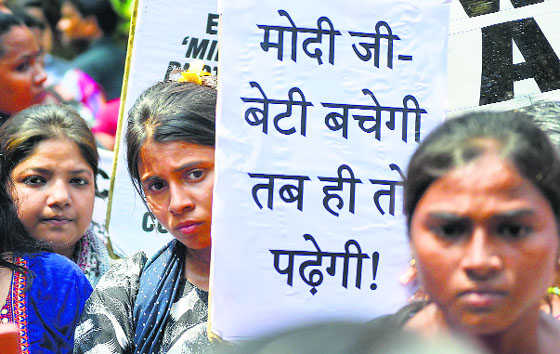
NO ESCAPE: Despite government slogans of ‘Beti Padhao’ the pursuit of education has been extremely troublesome for girls
Prem Chowdhry
Author and Former Academic, Delhi University
The media for the last couple of days has been shouting hoarse against the rape of a meritorious student of Haryana, who had been honoured by the President on Republic Day, ironically with a satirical slogan like ‘Beti bachao, beti rape karvow’. The parents of the girl are raising the same question and asking ‘Are we raising and educating our girls for this?’ — an unanswerable question. Indeed, rape has emerged as India’s fastest-growing crime. Haryana is especially notorious for this. Several districts like Rohtak, Hisar, Jind, Bhiwani, Yamunanagar, Panipat, Sonipat, Ambala, Karnal, Faridabad and Kaithal have gained notoriety as the rape districts of Haryana. According to the National Crime Records Bureau (NCRB) report for 2015, Haryana also recorded the highest rate of gang rapes per lakh woman population. There were 204 gang rapes in the state in 2015 which makes it 1.6 gang rapes per lakh woman population. This most recent case that has stirred the nation is that of 19 years old, a Haryana state topper in the class X examination and a promising baseball player who was abducted from a bus station in Mahendergarh, drugged and taken to Naya Gaon in Rewari, 40 km away, where 12 men raped her; then drove back to the bus stop and dumped her there. The men were from the same village and knew her family well.
Despite government slogans of Beti Padhao the pursuit of education has been extremely troublesome for girls. There are daily accounts of girls being sexually harassed on their way to the school. If this is the case of educated ones, what about the girls from the lower end of the spectrum? The NCRB report for 2015 shows the national rape statistics of Dalit girls/women went up by 15.41 per cent while the increase in Haryana was 167 per cent.
Rape of Dalit women in fact has emerged as special weapon to punish the Dalit community for a variety of reasons. Historically they have claimed a special entitlement to Dalit women. In several villages the newly married Dalit women were customarily required to spend the first wedding night with the landowner. More generally they have been sexually exploited (read raped) for years.
When confronted with a direct question as why they cannot marry the Dalit women instead of physically exploiting them, I elicited a shocking reply during my field work. One Jat boy crudely put, ‘who wants to marry a Chuhri, we only have intercourse with them.’
Sexual liaison of a dominant caste man with a lower caste woman seems to establishes his masculinity and virility. The same cannot be said of his serious intent to marry her. This intent introduces a kind of weakness contingent upon question of morality and ethics not necessarily associated with masculinity or virility. The much ‘coveted macho qualities’ stand above considerations of morality and ethics especially in relation to women of lower caste groups. The protest against this sexual violence has risen slowly but surely after independence. This is because, as explored in depth by me and other scholars, due entirely to the changed scenario relating to the steady rise of Dalits in fields like education, employment, and availability of other occupational opportunities, the near end of the jajmani traditional system of complete dependence of the Dalits and other landless farming castes on the dominant castes for sustenance and consequent lessening of their hold on Dalits, and impact of modernisation etc.
All this has meant a crystallisation of a middle class among Dalits. The emergence of this nebulous middle class category has proved disconcerting as there is a shift of emphasis from birth to one’s acquired status through self-achievement, enterprise and agency — all qualities associated with upper caste groups. The educated class among the dalits has a new self-perception as they have access to social mobility and portal of power, however limited. In other words, a different ‘social rank’ demanding a distinct degree of ‘social honour’ in which birth is in the background is undermining the hierarchically arranged society/groups. It is the opposition to this change and rising resentment against a section of Dalits that is getting transferred to the Dalits-at-large at the smallest pretext leading to the growing cases of atrocities and violence against them.
In infliction of violence rape of Dalit women continues to occupy a special a category. The rapists are almost never apprehended. Some even remain unnamed due to their influential contacts. In other cases great pressure is exercised on the survivor/s and the families to withdraw the case or compromise. This pressure comes not only from the side of the rapists but also the police and other bigwigs of the village. Even false cases are instituted against the males of the survivors’s family with the same purpose.
All the recent cases of rape whether of Dalit women or women of other caste groups show the same trend. The culprits are rarely punished. The delay in arrests and gathering of evidence, prolonged trials, the withdrawal of cases under pressure, the witnesses turning hostile etc. means the perpetrators going scot free. It is high time the authorities took cognisance of this severe ailment in Haryanvi society, acknowledge it and take prompt measures to assure the safety of women. Mere slogans of Beti Bacho Beti Padhao will no longer do.



























